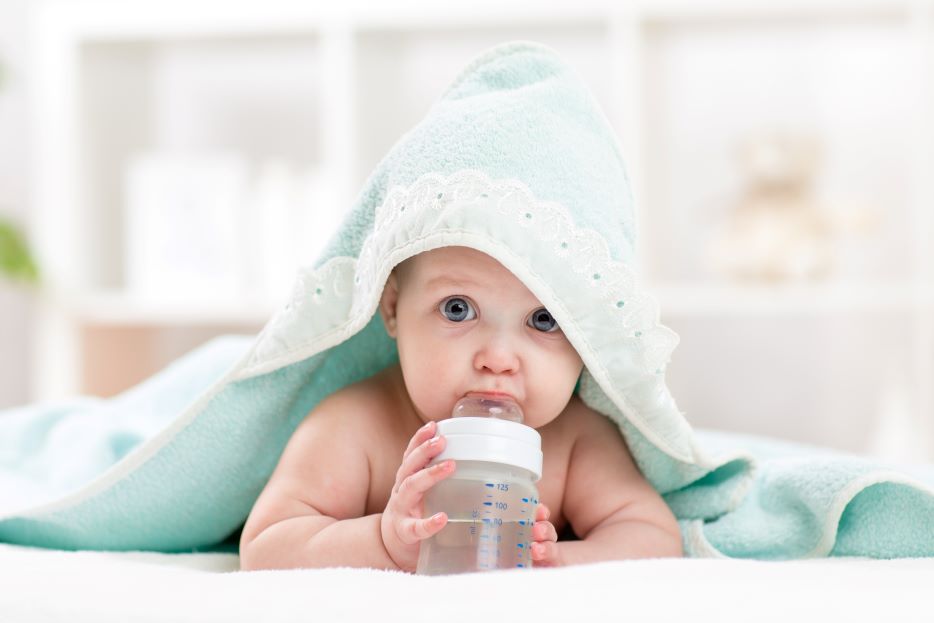Oh Baby: Preventing Baby Bottle Tooth Decay
August 22, 2024

Your baby’s first set of teeth are an important part of growing up. Unfortunately, many people don’t understand that though they will eventually fall out and be replaced by permanent teeth, baby teeth are still very vital to your child’s oral health and development. Baby teeth not only make it easier for children to speak and chew properly, but they also act as placeholders for adult teeth, so that when it comes time for those grown-up choppers to grow in, there’s a proper place for them to go. This is why caring for them is of the utmost importance.
But what happens when a very routine activity could make it hard to keep them safe? Here’s what every parent needs to know about baby bottle tooth decay.
What is Baby Bottle Tooth Decay?
You may have heard of a frustrating condition called baby bottle tooth decay. This occurs when your child develops cavities from falling asleep with a bottle of milk or juice in their mouth. Often, these nighttime or naptime drinks help soothe them to sleep, but unfortunately, they can leave sugars on the teeth that can damage them.
How Can I Prevent Baby Bottle Tooth Decay?
Preventing cavities in babies can be a challenge, especially when they require a bottle to fall asleep. The good news is that you can still give them a bottle to drink from at bedtime. Just be sure to brush their teeth and wipe down their gums before bed, and then provide them with a bottle of fluoridated water instead. This may take some time for your child to adjust to if they are used to milk or juice, however, it may help ease the transition by adding more water to their diet during waking hours to help get them comfortable with it.
Other ways to prevent tooth decay include:
- Do not share utensils or cups, as this can pass cavity-causing bacteria from person-to-person.
- Once teeth appear, use a child-sized toothbrush and fluoride toothpaste to gently clean each tooth twice a day.
- Keep pacifiers clean and do not coat them with sugar or honey.
- Avoid juice and stick to water, breastmilk, dairy milk, or baby formula.
- When breastfeeding, remove the nipple from their mouth once they have fallen asleep.
What Are the Signs of Baby Bottle Tooth Decay?
Tooth decay can be hard for parents to diagnose in young children, because they may not be able to speak well enough to articulate their pain. Thus, it is important to be aware of the warning signs on your own. These include:
- Pain in the mouth (your child may cry when eating or avoid chewing with the affected tooth).
- White spots on the teeth.
If you notice anything out of the ordinary, schedule an appointment with your child’s dentist as soon as possible.
Remember, baby teeth are very important in ensuring a lifetime of excellent oral health. It is never too early to start protecting your child’s smile! Be sure to begin bringing your child to the dentist as soon as their first tooth emerges so they can keep a close eye on their oral health as they grow!
About Dr. Vuppala
Dr. Ramu Vuppala loves working with kids and helping to teach them the importance of excellent oral health. He prides himself on making a trip to the dentist a positive experience for children of all ages and showing them that when it comes to caring for their teeth, there’s nothing to be afraid of. Dr. Vuppala is a member of the American Dental Association, Texas Dental Association, Academy of Laser Dentistry and the American Academy of Pediatric Dentistry.
To schedule an appointment for your child at Midland Kid’s Dentist, please visit our website or call us today at 432-520-5437.
No Comments
No comments yet.
RSS feed for comments on this post.
Sorry, the comment form is closed at this time.
